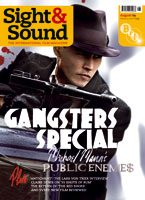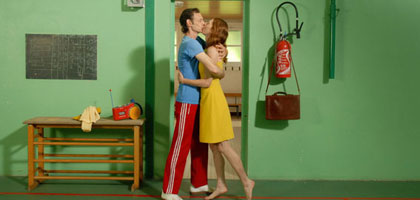Primary navigation

France/Belgium 2008

Reviewed by Kate Stables
Our synopses give away the plot in full, including surprise twists.
France, present day. Fiona and Dom, a pair of married teachers, love to perform Latin American dance routines. Returning from a dance contest they have a car crash while avoiding the lonely and suicidal Gérard. Fiona loses a leg and Dom develops permanent amnesia. Back at school, Fiona's flailing teaching and Dom's memory problems get them sacked. At home, Fiona's wooden leg becomes caught in a garden bonfire, and it burns the house to the ground. Returning from a trip to the bakery, Dom can't remember his way home, and is mugged for his chocolate croissant by a fellow bus passenger at the end of the line. By chance Gérard finds him and offers him sanctuary at his seaside shack. Fiona searches desperately for Dom, but finds only a dog, Rumba, holding his shoe. One year later, Dom and Gérard are running a doughnut stall on the beach. Fiona arrives with Rumba, dreaming of her lost love and their dancing happiness. During a rainstorm, the couple meet at the stall and are drawn to one another, even though Dom can't recall Fiona. They sit happily, while Gérard, lonely once more, prepares to drown himself.
Now that pure physical comedy in cinema has been reduced to the dorkily predictable antics of Mr Bean's Holiday, how delicious to come across the charmingly original, quirkily tragicomic and nearly wordless world of film clowns Dominique Abel and Fiona Gordon. Working with co-director Bruno Romy on their second feature together, they are resuscitating the comic vocabulary of the silent cinema which derived from clowning, mime and dance, and pushing it in unexpected directions. Rumba, the story of happy hoofing teachers Fiona and Dom whose life mercilessly unravels after they are involved in a car accident, has a cute but disconcertingly Kaurismäkian mordancy (the narrative takes in an amputation, brain damage, a house fire and a mugging) that adroitly updates the rubbery, indestructible clowning of their heroes Keaton and Chaplin. Where Jacques Tati's M. Hulot (an obvious influence, particularly in a gently slapstick beach routine) wrestled with the modern world, and Keaton with the elements, here Abel and Gordon's characters are knocked progressively lower by a malign Fate but soldier on with bewildered yet unsinkable optimism. For classic silent comedians, the humour often came from the parade of personal disasters courted but averted. Here it's in the disaster experienced in all its comic glory, and survived in style.
Like L'Iceberg (2005), the trio's lauded but patchy previous feature, which centred on an unhappy housewife's voyage to the Arctic, Rumba takes a simple central conceit, that of the terminally unlucky couple, and uses it as a peg on which to hang their deadpan clowning sequences. When these work, their escalation of clumsy hilarity is glorious, for example in an inspired set piece when Fiona's wooden leg catches light in a garden bonfire and the pair unwittingly burn the house down room by room as they struggle to put it out. Gordon, whose game, determined awkwardness as an amputee plays in poignant contrast to her litheness in the opening Latin dance routines, has a genius for eccentric, expressive physical comedy. Reeling round her classroom in a tumbling, juggling whirl of crutches and chalk until she trips out of an open window, she forces an involuntary bark of horrified, empathetic laughter from the viewer. By contrast Abel, whose goofy individual scenes feel more forced, is funniest when the pair are in slapstick synch on screen.
The film's overall reliance on choreographed sequences makes for occasional lacunae when gags or sketches don't hit their mark. This counts for little with a misfire like a groaningly overextended automatic-door routine. But as amnesiac Dom suffers through an endless wriggly comedy mugging and morose rescue, both the pace and the mood dip alarmingly, and the film, like Fiona, seems to lose its footing. Similarly Abel, Gordon and Romy's stylised colour schemes and taste for retro effects such as back-projection or sepulchral day-for-night shooting are employed so tirelessly that they're in danger of appearing arch, rather than affectionate nods to past cinema.
Still, the film's energetic sweetness, tempered with a stoical melancholy, carries one through its lapses, along with its ceaseless visual invention. Watching Dom and Fiona's shadows detach themselves from their gloomy owners to cavort along a whitewashed wall in a wild improvised rumba, or the inadvertent unwinding of a woollen dress till it forms a cat's cradle with passing pedestrians, one can't help but be beguiled by Rumba's elegant absurdity, as well as its fancy footwork.